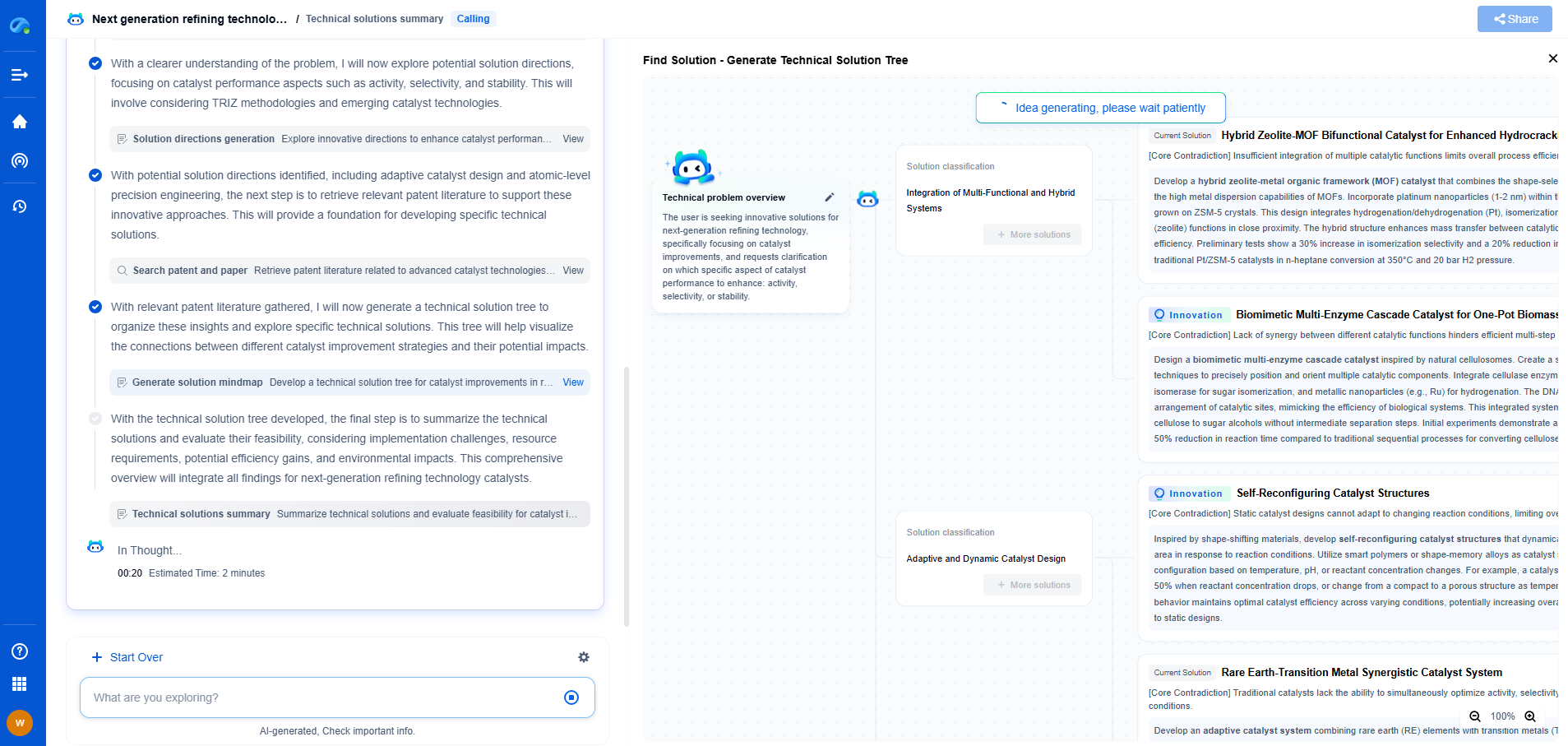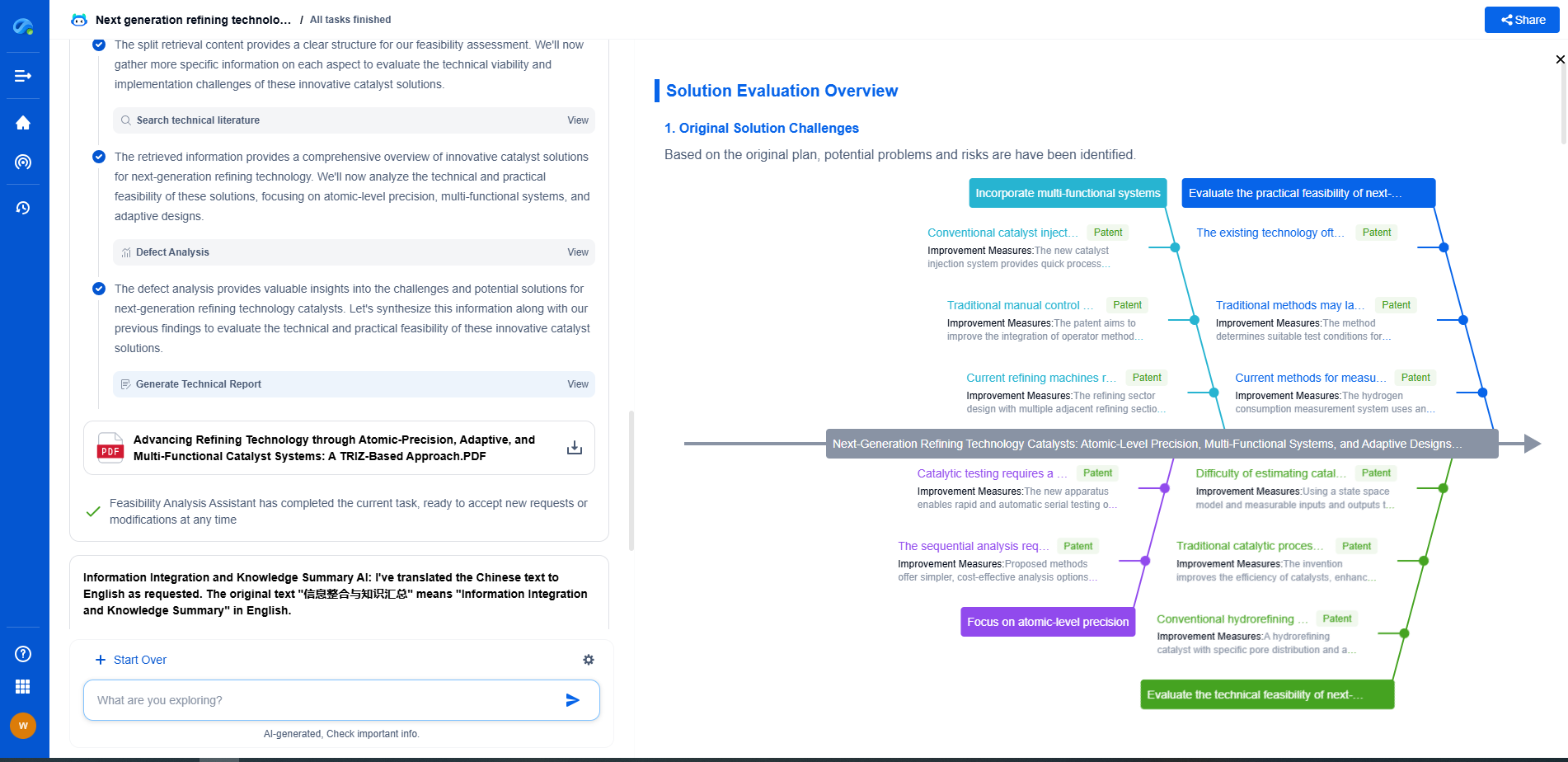How Control Systems Keep Offshore Oil Platforms Safe and Efficient
JUL 2, 2025 |
Offshore oil platforms are marvels of modern engineering, designed to extract valuable resources from beneath the ocean floor. These structures face numerous challenges, including harsh weather conditions, deep water, and complex geological formations. To ensure their safety and efficiency, robust control systems are implemented. These systems play a crucial role in monitoring, regulating, and optimizing various operations on the platform, safeguarding both human lives and the environment while maximizing production.
The Role of Control Systems in Safety
Control systems are integral to maintaining safety on offshore oil platforms. They are responsible for monitoring various parameters such as pressure, temperature, and flow rates of fluids. By doing so, they can detect anomalies or potential hazards in real-time. For example, if a sudden drop in pressure is identified, it may indicate a leak or equipment failure. Control systems can trigger alarms and initiate automatic shutdown processes to prevent accidents and minimize risks.
One of the most important components of a control system is the blowout preventer (BOP), which is designed to seal off the well in case of uncontrolled pressure surges. The BOP is controlled remotely, allowing operators to respond swiftly to emergencies. Additionally, control systems facilitate the safe operation of drilling equipment, cranes, and other machinery, reducing the likelihood of accidents caused by human error.
Enhancing Efficiency with Automation
Efficiency is a key consideration for offshore oil platforms, and control systems contribute significantly to optimizing operations. Automation is a central feature, enabling platforms to operate with greater precision and reduced downtime. Advanced sensors and real-time data analytics allow for predictive maintenance, which helps in anticipating equipment failures before they occur. This proactive approach minimizes disruptions and enhances productivity.
Control systems also optimize the extraction process by adjusting drilling parameters based on geological data. By continuously analyzing the composition of extracted resources and the condition of the well, the system can make real-time adjustments to maximize output. This level of automation ensures that resources are extracted efficiently while minimizing waste and environmental impact.
Environmental Protection and Monitoring
Offshore oil platforms are located in sensitive marine environments, making environmental protection a top priority. Control systems play a vital role in monitoring and mitigating environmental impacts. For instance, they track emissions and discharges, ensuring compliance with environmental regulations. The systems can automatically adjust operations to reduce pollution, such as controlling flare systems to minimize gas emissions.
Furthermore, control systems are equipped with sensors to monitor the integrity of pipelines and storage tanks, preventing spills and leaks. In the event of any detected irregularities, corrective actions can be taken swiftly to protect marine life and ecosystems. The integration of environmental monitoring into control systems reflects the industry's commitment to sustainable practices.
Advancements in Control System Technologies
The oil and gas industry is continually evolving, with advancements in control system technologies driving improvements in safety and efficiency. Innovations such as artificial intelligence and machine learning are enhancing the capabilities of control systems. These technologies enable systems to learn from historical data, identifying patterns and optimizing operations accordingly.
Remote monitoring and control have become increasingly prevalent, allowing operators to manage platform functions from onshore facilities. This reduces the need for personnel on the platform, minimizing risks and operational costs. Additionally, digital twins—a virtual replica of the physical platform—are being used for simulation and analysis, facilitating better decision-making and strategic planning.
Conclusion
Control systems are indispensable to the operation of offshore oil platforms, ensuring they remain safe, efficient, and environmentally responsible. Through advanced monitoring, automation, and technological innovation, these systems optimize resource extraction while mitigating risks. As the industry progresses, continued investment in control systems will be essential to address future challenges and opportunities. By harnessing the power of technology, offshore platforms can continue to thrive, delivering vital resources safely and sustainably.
Ready to Reinvent How You Work on Control Systems?
Designing, analyzing, and optimizing control systems involves complex decision-making, from selecting the right sensor configurations to ensuring robust fault tolerance and interoperability. If you’re spending countless hours digging through documentation, standards, patents, or simulation results — it's time for a smarter way to work.
Patsnap Eureka is your intelligent AI Agent, purpose-built for R&D and IP professionals in high-tech industries. Whether you're developing next-gen motion controllers, debugging signal integrity issues, or navigating complex regulatory and patent landscapes in industrial automation, Eureka helps you cut through technical noise and surface the insights that matter—faster.
👉 Experience Patsnap Eureka today — Power up your Control Systems innovation with AI intelligence built for engineers and IP minds.
- R&D
- Intellectual Property
- Life Sciences
- Materials
- Tech Scout
- Unparalleled Data Quality
- Higher Quality Content
- 60% Fewer Hallucinations
Browse by: Latest US Patents, China's latest patents, Technical Efficacy Thesaurus, Application Domain, Technology Topic, Popular Technical Reports.
© 2025 PatSnap. All rights reserved.Legal|Privacy policy|Modern Slavery Act Transparency Statement|Sitemap|About US| Contact US: help@patsnap.com

